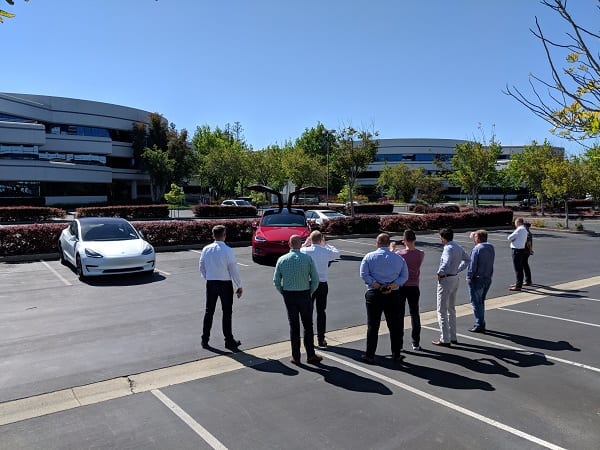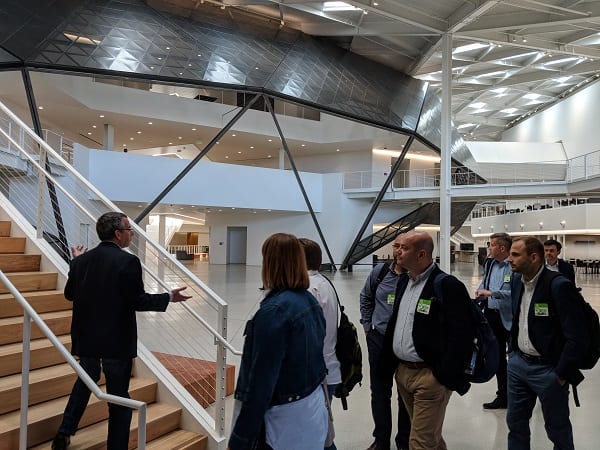The automotive industry as a whole is facing an unprecedented wave of innovation and potential change, from connected cars to ridesharing to autonomous vehicles. Over the next couple years, the ways in which consumers own and use vehicles may be dramatically reshaped – and so will the ways in which they shop for and finance them.
One of the leading providers of automobile financial services, Volkswagen Bank in Poland, a subsidiary of Volkswagen Financial Services, is already ramping up efforts to come up with new car-buying experience to meet shifting clients’ preferences. With that in mind, executives from the bank joined an executive immersion program to see the ongoing changes and disruptions currently shaping the captive finance industry. A captive auto lender is a finance subsidiary set up solely to offer auto financing to buyers of a particular dealership or car company.

“It’s really important for us to understand the current disruption because it will help us, it will support us in the necessary adjustments for our strategy in order not only to be successful in the future but maybe really to survive in this very competitive environment,” said Miko?aj Wo?niak, Chairman of the Board at Volkswagen Bank.
The Future of Mobility
The captive industry is facing disruption from many sides. New competitors enter and players who fail to adjust disappear. Mobility is on the cusp of fundamental transformation. The rise of a new mobility ecosystem will mainly be shaped by two key factors: the extent to which mobility is individually owned or shared; and whether cars will be driven or become fully autonomous.
As such, Volkswagen Bank understands that surviving the new and ever-changing mobility landscape calls for new mobile solutions. Financing should not just be an afterthought but a part of a holistic customer experience.
During the five-day tour, Western Union demonstrated the availability of an overall digital strategy to cope with the customers’ constantly increasing digital maturity. Western Union serves 70 million customers in 200 countries, making data management central to its operations to enable its customers to transfer money to and from almost any place in the world. Western Union’s successful digital transformation allows it to handle millions of transactions every year.
Volkswagen learned from Wecash’s use of big data how to provide credit assessments in less than 15 minutes. Volkswagen Bank can have a holistic view of its consumer’s credit score to support their credit decisions through the use of machine-learning algorithms which integrate finance knowledge, Internet data and the mobile network.
What Volkswagen Bank learned from the two companies can be a great addition to their ongoing “comprehensive digitalization offensive” which aims to provide all essential mobility-related services online in the near future. Volkswagen Bank has initiated ROUTE2025 to respond to consumer demands and changes in the automobile financial services industry. From financing or leasing, insurance or vehicle services, ROUTE2025 will cement Volkswagen Bank’s reputation as a mobility service provider with innovative and helpful offers for their customers.

Meeting Customers’ Expectations through Modern Financing
With the competitive environment continuously changing, providing customers with a seamless experience is imperative. Creating modern solutions for the clients, such as implementation of new payment methods, is key to giving clients their needed flexibility and convenience.
Volkswagen Bank’s products and services such as payment solutions via smartphone app, vehicle products bookable online, fleet management or just classic banking are now available anytime and in most places around the globe.
As the company continuously harnesses new opportunities offered by digitalization,
Oracle showed Volkswagen Bank how this modernization can deliver the experiences the customers expect. Oracle also stressed the importance of transforming business practices for operational excellence. This method is best shown in Volkswagen Bank’s new Digital and Innovation unit that combines digital and strategic activities to deliver new products.
Meanwhile, a visit to the Google campus enabled the team to discuss how to create and nurture an innovation culture. They met with Google’s engineering director who “specializes in bringing order to chaos making services faster, structured, efficient, and talking to the business in their language.” The discussion was especially helpful as new concepts and ideas are developing at Volkswagen Bank’s newest unit at full speed.

Financing the car of the future
Understanding future vehicle trends provides a foundation for understanding potential trends in auto financing. Volkswagen Bank visited electric vehicle pioneer Tesla. The California-based company is committed to be the best in safety, performance and reliability of all its cars while accelerating the world’s transition to sustainable energy through affordable electric vehicles. With 180,000 vehicles on the road worldwide, Tesla continues to innovate, scale and reduce the costs of commercial and grid-scale systems to ultimately get consumers to use 100% renewable energy.
Tesla also pioneers autonomous vehicles which is becoming more and more popular mainly because of its convenience. This new technology can dictate what products or services auto finance companies can offer their customers. For example, much of the traditional financing model may remain in place as autonomous vehicles are still likely sold to individuals. But individual loan size may increase as the preference shifts from traditional to a more luxurious autonomous car.

“We met extraordinary people in terms of the perception, vision, and vision execution. What is really nice they were all passionate in what they do, believers who are not concentrating on failures, but concentrating on what they can learn in order to improve for the future,” said Miko?aj Wo?niak, Chairman of the Board at Volkswagen Bank.
The captive industry may face disruptive changes today, but Volkswagen Bank demonstrates that these changes also provide tremendous business opportunities. As leaders in this field, Volkswagen Bank will continue to strive for innovation in this digital era to ensure the continuous success of Volkswagen. In the end, the future belongs to those who are open to change and willing to take bold decisions to continuously develop a relationship with their customers.